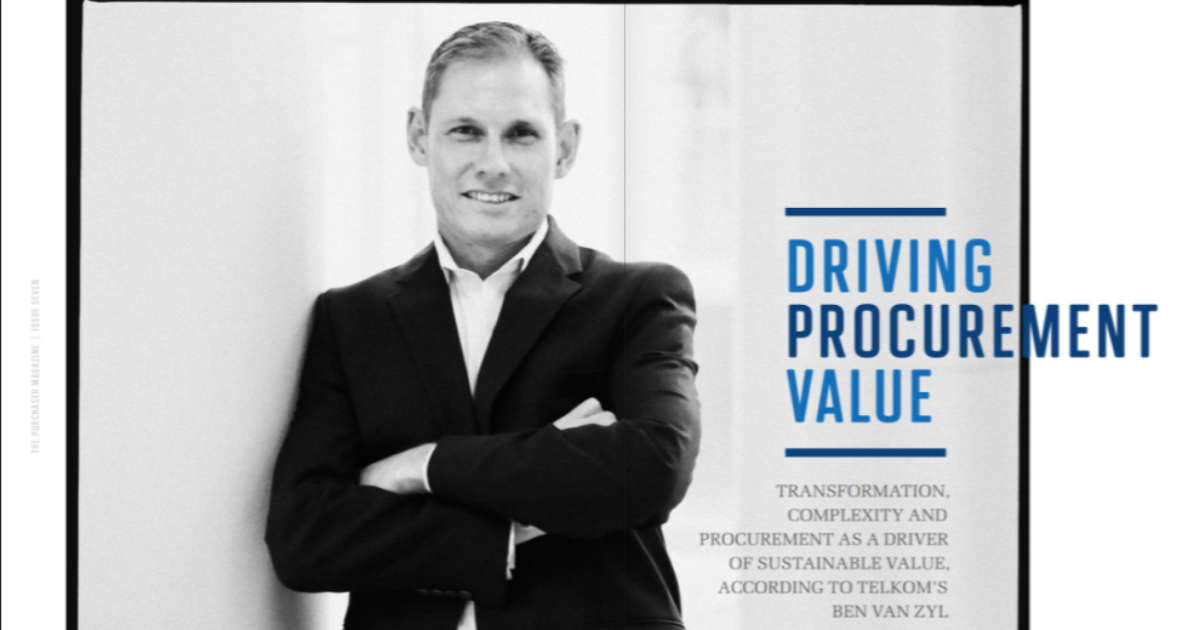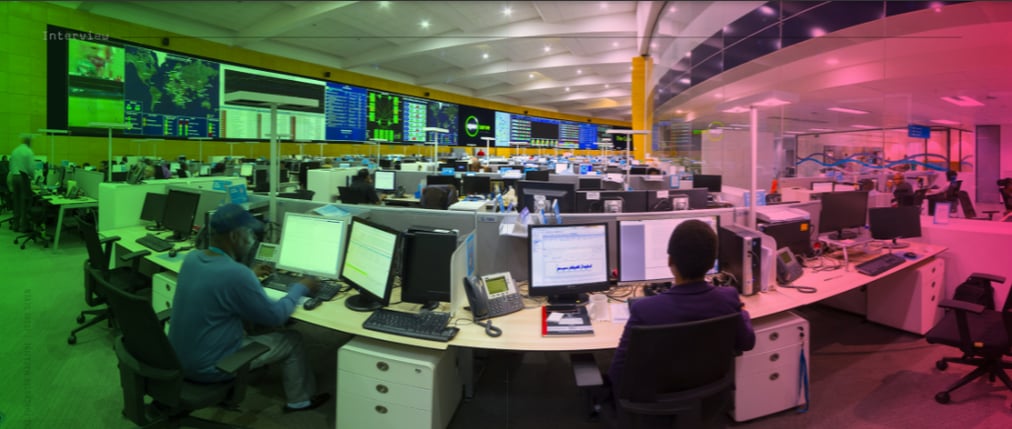
Transformation, complexity, and procurement as a driver of sustainable value, according to Telkom’s Ben Van Zyl: An article by The Purchaser.
Tell Ben Van Zyl that procurement is only about cost savings, governance, compliance or any of the other traditional aspects of the role and he'll respectfully disagree. For a procurement and supply chain leader of Van Zyl's experience, those points are a given–they are the bread and butter of daily procurement. In today's more complex and rapidly evolving world, the role of a high-performing procurement function, like the one he has led at South Africa's Telkom since 2019, is about something far more crucial to overall strategic success: driving value.
That value, as Van Zyl goes on to explain, is multifaceted, encompassing several key areas that he insists must be embedded within the organisation and ultimately play a crucial role in delivering on the broader strategic objectives of the business.
Over the last years, he and his procurement colleagues have firmly practised what he preaches, guiding the procurement business through a significant transformation programme that includes overhauling governance frameworks, focusing on cost control, technology adoption, and delivering a new procurement structure and operating model. More recently, new areas of focus, including developing a group-wide sustainability framework, cybersecurity risk, disruption and more, have added to an increasingly complex procurement environment.

Procurement Evolution
But that complexity is de rigueur for the modern procurement leader, says Van Zyl, outlining how the role–and the broader function–have changed over a 20-year career that has covered strategic sourcing, procurement, and supply chain management for leading financial and telecommunications organisations. "The most obvious changes over that time are how the role of technology has vastly increased. For example, source to settle platforms that improved operational performance by driving automation, but also things like better market intelligence and fantastic spend analytics and visualisation tools to give you greater reporting and insight to optimise spend and cash, and importantly, improve strategic decision making.”
"At Telkom, I've made sure that procurement has a seat around the table, it's really important for that to happen in terms of being representative of how the business views procurement," says Van Zyl." A good leader still needs the commercial acumen to act as an advisor, but you have to be able to 'sell' procurement value to the business. You need to then back that up by delivering on that value promise or you will lose trust. As an example, we’re currently developing a list that’s akin to procurement KPIs that are aligned to the business objectives–that’s my contract with the organisation, and me and the team have to deliver on it to succeed.”
Transformation At Telkom
And deliver they have. Van Zyl joined Telkom in 2014, originally as Managing Executive: Transformational Sourcing, before moving to Openserve, part of Telkom, in the role of Chief Procurement and Contracts Officer. "At the start of 2019. I was asked to head up procurement contract management for the group–the role I currently hold," he continues.
"I was stepping into a group role essentially overseeing procurement while also overseeing the supply chain businesses for Openserve and Consumer. There were a number of areas we had to address and focus on at that point, including establishing a centre of excellence model, building a strong analytical capability with an equally strong cross-functional team of subject matter experts, developing a new governance framework, and doing a lot of work around risk management, including work with our partner Inoxico on risk vetting and conflict of interest checks. Our diversified supply chain placed us in a strong position when COVID disruption struck.”
“Our job is to add value across the organisation so we, as a procurement function, will play a big role in implementing the sustainability framework.”
“The transformation since 2019 has been significant,” says Van Zyl, further detailing the key areas of work to date. "When I took the role, I think business was a little frustrated at the pace at which some procurement processes moved. At the same time, there were some areas of improvement highlighted in an audit; findings around things like contract management and ineffective procurement processes. As a result, my attention was largely on those areas of risk, governance, and putting a new procurement structure and operating model in place, all to allow for more flexibility and agility whilst also maintaining the control.”
"As part of that work I realised pretty quickly that my reporting was bad; I was getting different answers from different reports and just didn't have the visibility to drive meaningful insights," he continues. "With experience, you can trust your instinct to a degree, but you need to have good data and analytics to make effective decisions. We built a spend cube and made significant improvements to have one single version of the truth; to progress it was really important to improve the reporting and analytics capabilities.”
.png?width=510&name=unnamed%20(1).png)
Technology And Decision Making
Van Zvl makes no bones about being a facts-based leader, supporting his decision making with reliable and holistic information. In this regard, technology adoption has played an important role in the transformation work to date. "It is the catalyst and enabler to improve performance and move far more quickly,” he reveals. "We've implemented e-sourcing and e-procurement solutions, spend analysis, have automated the requisition to order process and we're adopting contract management and supplier performance management solutions that will add tremendous value to the organisation. Further automation will remain a big focus area in procurement, similar to the drive for innovation and automation in our billing system with Amdocs.”
"Specifically on supplier performance, we're sweating the assets we have by using one of the Ariba modules to create a heat map of supplier performance," says Van Zyl. "Being able to give that kind of detailed information to the business will help to ensure we're putting in the right processes and improvement plans, but it will also drive the right behaviour from our suppliers. My goal is that, by the end of the year, we'll have our first dashboards available for the senior team, and we'll drive this forward from there.”
Innovations like this can go some way towards cutting through a procurement environment that, says Van Zyl, has become increasingly complex in recent years. "Just look at the last two years alone," he notes, "there's very different dynamics to the role as a result of several significant events like geopolitical risk between the US and China, cybersecurity issues like the big hacking incident that we faced here at Telkom and, more recently, the supply chain disruption caused by COVID and the global chip shortage. All of these highlight the importance of having the right procurement and supply chain risk management processes in place. Working with key suppliers like ZTE to keep buffer stock on customer-facing equipment shows how strategic partnerships can reduce the risk impact and serve our customers better.”
"There's other dynamics, too," he continues. "Sustainability–driven by everyone from investors and shareholders to clients, partners and internal stakeholders–is becoming essential at a strategic level, as is improving diversity and inclusion initiatives both in our business and at our suppliers. All these issues are crucial and need to be embedded into your organisation–and not to the extent where you're saying they're a focus for the future, but so that you're making real, measurable changes now that make a difference to people's lives.
Sustainability, Risk And Change
Van Zyl is currently engaged in several of these key areas at a strategic level at Telkom. Developing and implementing a sustainable procurement strategy that aligns with the company's environmental, social, and governance (ESG) objectives is at the top of the list, he says. "Our job is to add value across the organisation so we, as a procurement function, will play a big role in implementing the sustainability framework. To do that, we have to ensure that purchasing reflects the broader goals linked to resource efficiency, climate change, social responsibility, and economic resilience. We already have a supplier code of conduct in place and have had great buy-in from our partners; it's extensive and covers data, privacy, protection of human rights, economic empowerment, anti-corruption, business continuity management and so on.”
"If you then look at the wider ESG pillars for the business, you really have suppliers and supply chains across them all," he adds. "In that respect, our approach is now to take this to the next level by working with the Telkom Group Exco to understand their ambition and get their guidance. Telkom doesn't want to be just compliant and tick boxes, but wants to have a real differentiating strategy that identifies key areas of improvement, allocates the necessary resources and investment, and identifies collective actions and targets for the next five to ten years.”
Alongside sustainability, further enhancing supply chain resilience is a core focus for Van Zyl and his team. COVID, he explains, demonstrated the risks associated with global supply chains and the importance of having greater visibility across the supplier network. As a result, he and his colleagues have been collaborating closely with suppliers, understanding trade routes, and working on ways to build further agility and resilience into the supply chain.
.png?width=479&name=unnamed%20(2).png)
"Risk management is linked closely with the work around supplier relationship management and contract management,” says Van Zyl. "We're going to analyse every area, whether it's legal risks, financial sustainability or operational risks, to ensure we have a proactive approach and that we're not just on a tick-box exercise. We're already making great progress in this regard; we were able to react well to the challenges that COVID brought as a result of some of the strategic work we'd already implemented like redesigning products and processes with Huawei to remove complexity in our network build programme, or optimising the safety stock through our supply chain partner Barloworld Logistics and diversifying our supply base. So it's about building on that.”
Hard work, strategic acumen, and technology are undoubtedly crucial to delivering on this future ambition, but so too, is effective leadership and the develop[ment of a workplace culture that enables change. Without the right team, says Van Zyl, you achieve nothing for the organisation. “The importance of culture shouldn’t be underestimated and is the key ingredient for successful change,” he says. “When there’s uncertainty around change or transformation, it can impact morale, behaviour and performance. My job as a leader is to create that culture and set the expectation of how we should behave and work together.”
“I’ve always enjoyed building high-performance teams. First, you set a clear and aligned purpose that everyone understands–people have to know why we’re doing what we’re doing, and they have to feel a sense of belonging to that purpose or mission. At the same time, you create a shared sense of achievement through trust and building close relationships within the team; communication is absolutely critical to do this. If you get this right, and we have to so we can drive these new operating models and changes, then you deliver for the organisation. There’s a lot happening and a lot to do, but it’s an exciting time.” >> www.telkom.co.za <<



